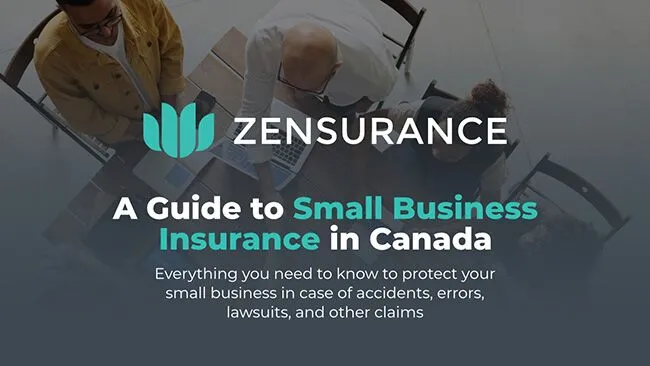Whether you’re required to buy liability insurance by your industry or the law, insurance is essential to every business owner’s or independent professional’s financial wellness and achieving long-term economic stability.
However, protecting your financial well-being and livelihood with a customized business insurance policy requires understanding your liability risks and legal and industry requirements. There are different factors to consider before buying or renewing a policy, and there are mistakes to steer clear of by thinking about your needs.
Here are 10 common mistakes many people make when purchasing business liability insurance:

Download Our FREE Insurance Guide
Learn everything you need to protect your small business.
Whitepaper download
"*" indicates required fields
Your email address will be used by Zensurance to provide latest news, offers and tips.
You can unsubscribe at any time.

Related Posts
Sign Up for ZenMail
"*" indicates required fields
Categories
1. Underestimating Your Coverage Needs
When buying a policy, it’s not about getting any insurance coverage but the right type.
It’s critical to accurately assess the risks you face to understand your business’s coverage needs. Failing to do so can result in inadequate coverage that could leave you in a financial bind if you file a claim and are told you aren’t covered.
Example: A new restaurant owner purchases general liability insurance but doesn’t consider adding liquor liability coverage. That leaves the owner exposed to claims arising from alcohol-related incidents.
2. Focusing Solely on Buying the Cheapest Policy
If your sole focus when getting insured is paying the cheapest premium possible without considering its coverage limits and deductibles, you may be putting yourself at risk of being underinsured.
Example: A retailer opts for the cheapest business insurance policy with low coverage limits and high deductibles. If a fire scorches the property and inventory, the policyholder’s low coverage limit might not be enough to pay for the damages, leaving them to pay the difference. Also, they’ll be in a more precarious situation if they don’t have the funds available to pay the high deductible they chose.
3. Not Reviewing Your Policy’s Exclusions
Neglecting to review your policy’s exclusions can come back to haunt you.
All insurance policies have exclusions – risks, hazards, or events not covered by your policy. If you don’t know about them, it can lead to gaps in your coverage, leaving your business vulnerable.
Example: If a construction company buys commercial property insurance for its office place but overlooks the policy’s exclusion for flood damage and the property is flooded, its insurance provider won’t pay to repair the damages to the building or replace their waterlogged contents, electronics, and furniture.
4. Underestimating the Value of Your Property
Underestimating the value of your business property, equipment, or inventory can result in insufficient coverage limits. It’s important to create and maintain a contents inventory list to get a better picture of your contents and inventory values. Knowing the difference between actual cash value and replacement value coverage for commercial property insurance is equally important.
Example: If an IT consulting firm underestimates the value of its office equipment when purchasing commercial property insurance and a fire destroys the office, and everything in it, what its insurer pays out won’t cover all of the firm’s losses.
5. Failing to Update Your Coverage Requirements
Whenever you make changes to your business – new products or services, moving to a different location, hiring more employees, buying new equipment – you need to inform your broker or insurer to update your policy. Failing to update your coverage can leave you underinsured or exposed to unexpected losses.
Example: A retailer adds new inventory to sell but neglects to inform their insurance provider and update their coverage limits, leaving the additional inventory uninsured.
6. Skipping Buying Cyber Liability Insurance
Almost every small business or self-employed professional has a website, uses email and social media, has a point-of-sale (POS) system, and stores confidential information in cloud storage. Cyber liability insurance is necessary to cover the cost of damages if you’re hit by a cyber-attack or suffer a data breach – almost half of Canadian small businesses (45%) experienced a random cyber-attack, and 27% endured a targeted attack in 2023.
Example: An e-commerce retailer doesn’t buy cyber liability insurance, and hackers breach the company’s website, stealing customer payment information and exposing the business to lawsuits and regulatory fines.
7. Assuming Homeowner or Personal Car Insurance Covers Businesses
Don’t assume your homeowner insurance will cover business assets and liabilities if yours is a home-based business. Many homeowner policies don’t cover business-related risks or have insufficient coverage limits. Likewise, if you have a business vehicle, private-passenger car insurance isn’t designed to cover vehicles for commercial use, whereas commercial auto insurance is.
Example: A freelance graphic designer assumes their homeowner insurance policy will cover the computer equipment used for their home-based business. However, the policy excludes coverage for business property, leaving the equipment uninsured in the event of theft or damage.
8. Overlooking Business Interruption Insurance
Business interruption insurance is often included in a commercial property insurance policy or can be added as an endorsement. It’s wise to include it since it covers your business’s overhead, utility bills, loan payments, and employee payroll if you’re forced to temporarily close while repairs are underway following an insurable loss, like a fire.
Example: A small manufacturing company fails to purchase business interruption insurance. After a fire rips through the building, production is halted for several weeks until repairs are completed. The company suffers significant financial losses due to lost revenue.
9. Not Buying Professional Liability Insurance
Professional liability insurance is a must-have if you provide services to or consult and advise your customers. Also known as errors and omissions (E&O) insurance, it covers you for allegations or claims of professional negligence, mistakes, or wrongdoing that causes a customer physical, financial, or reputational harm.
Example: An accountant completes a financial analysis of a customer’s business. The business owner used the documents the accountant provided to sell the company. However, the purchaser of the business discovered errors in those documents that significantly inflated the sale price. The new business owner sues the accountant to compensate them for the difference due to their mistake.
10. Not Partnering With a Broker to Shop Your Rate
Business insurance can be complex and challenging to understand. Not partnering with an experienced business insurance broker to help objectively assess your risks and needs, review policy options, and ensure you have adequate coverage is akin to a roll of the dice.
Besides finding a competitive rate for the coverage you need from several insurance providers, there are many reasons why consulting an insurance broker can help you preserve and protect your business’s financial wellness.
Example: A sole proprietor decides not to work with an insurance broker when purchasing a policy. That fateful decision results in gaps in their coverage, exposing them to paying for damages or legal advice if they’re sued.
How to Get the Comprehensive, Low-Cost Protection You Need
Zensurance specializes in providing small business owners and independent professionals with the low-cost, comprehensive business insurance protection they need.
Fill out our online application for a free quote and explore your options.
Our knowledgeable brokers will take the hassle of getting insured off your hands, advise you on the coverages and coverage limits you need, and customize the policy to suit your needs and budget.
Related Posts
Additional Interest and Additional Insured: What’s the Difference?
Adding a third party to a business insurance policy can be done by including them as an additional interest or an additional insured. While both methods involve adding a third party, they have distinct purposes. Here’s what business owners need to know.
What Is a Business Insurance Exclusion?
Commercial insurance policies contain exclusions. An exclusion defines what is not covered by a policy. Understanding exclusions helps you know what is and is not covered. Here’s what to know.
The High Cost of Vandalism: 5 Vandalism Small Business Insurance Claims
Categorized as a property crime, vandalism is defined as the deliberate damage or destruction of property. Along with theft, it’s a persistent threat to small businesses. Explore five vandalism claims our clients filed and how insurance helped them recover.